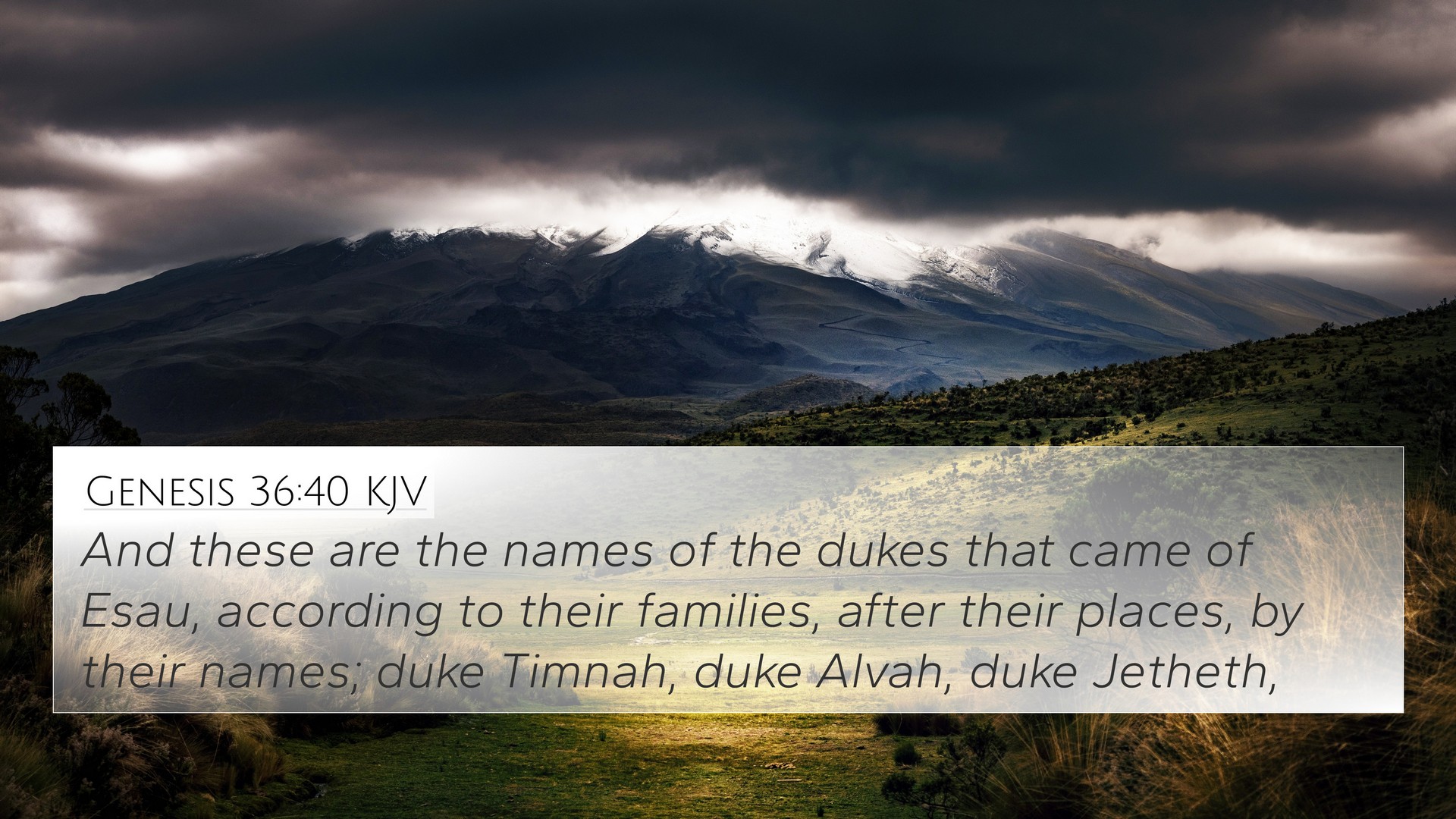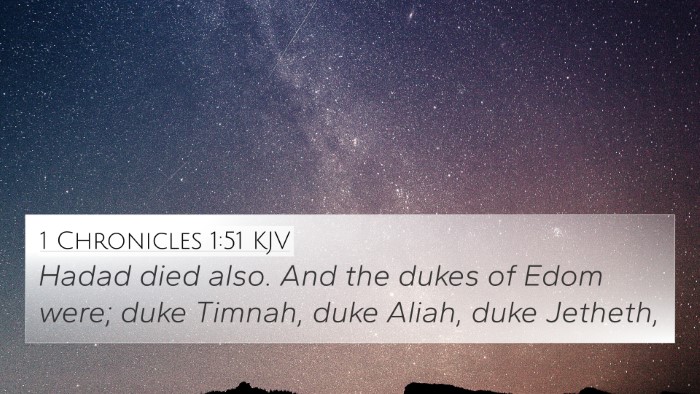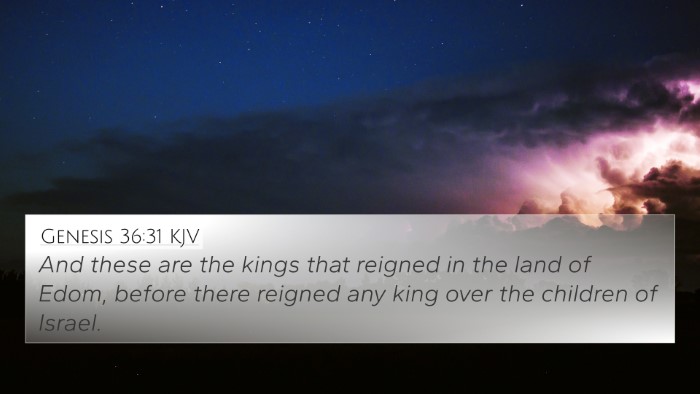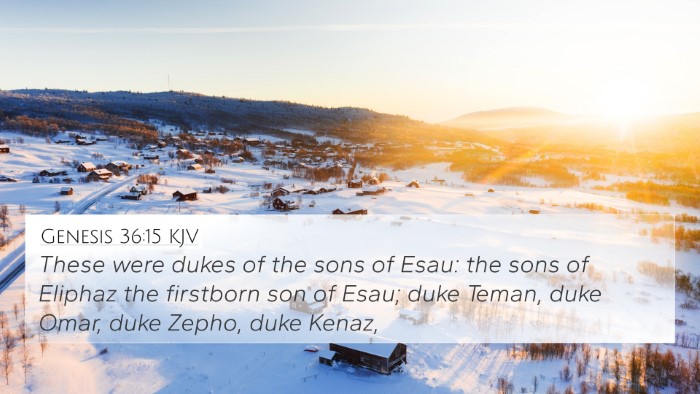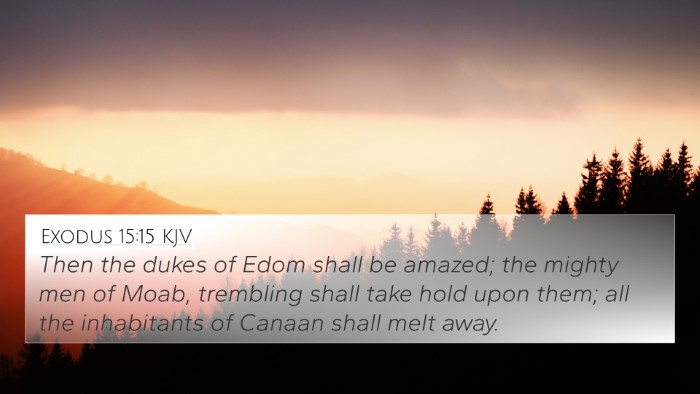Understanding Genesis 36:40
Verse Reference: Genesis 36:40
Verse Text: "And these are the names of the dukes that came of Esau, according to their families, after their places, by their names; duke Timnah, duke Alvah, duke Jetheth."
Meaning and Context
This passage is part of the genealogical record that outlines the descendants of Esau, also known as Edom. It serves to highlight the significance of Esau's lineage and the establishment of tribes and rulers that emerged from his family. The mention of the 'dukes' indicates the leadership roles held by these descendants, marking a departure from the patriarchal fathers that preceded them.
Insights from Public Domain Commentaries
Combined insights from notable biblical scholars provide a nuanced understanding of this verse:
- Matthew Henry: Henry emphasizes that genealogies are important for acknowledging God's promise of land and blessing. The names listed signify the fulfillment of such promises, indicating how God’s purpose continued through Esau’s lineage.
- Albert Barnes: Barnes notes that the dukes mentioned were leaders of various clans, indicating a division of power and organization among Esau's descendants. This reflects the broader theme of tribal identity that was prevalent in the ancient Near East.
- Adam Clarke: Clarke provides critical reflection on the significance of names in scripture. He suggests that the names of the dukes represent more than mere titles; they embody the legacy and history that is intertwined with the narrative of Israel.
Connections to Other Bible Verses
Genesis 36:40 establishes several thematic connections with other passages throughout the Bible. Here are 10 key cross-references that relate to this verse:
- Genesis 25:30: This verse outlines the relationship between Esau and Jacob, the foundational narrative for their descendants.
- Genesis 36:1: This verse initiates the genealogy of Esau, providing context for the subsequent names and titles.
- Genesis 49:8-12: Jacob’s blessings to his sons show the contrast between the lineage of Israel and Edom.
- Deuteronomy 2:5: Refers to the land that Esau's descendants were allowed to inhabit, emphasizing the territorial blessings.
- Obadiah 1:18: This verse speaks of the fate of Esau’s descendants and their relation to Jacob’s, showing a prophetic vision of their future.
- 1 Chronicles 1:35-36: This passage provides additional genealogical details on Esau, reaffirming the significance of his lineage.
- Romans 9:13: Here, Paul reflects on God's selection through the lineage of Jacob and Esau, indicating a spiritual dimension to their descendants.
- Hebrews 12:16: This verse discusses Esau's character, providing a moral lesson on not pursuing sinful desires.
- Malachi 1:2-3: This passage contrasts Jacob and Esau, illustrating God's sovereignty in electing nations.
- Matthew 2:1-2: The mention of King Herod illustrates the political significance and lineage tracing back to Edomite roots.
Thematic Bible Verse Connections
The genealogies found in Genesis chapter 36 can also be seen as a reflection of broader biblical themes:
- Identity and Legacy: The emphasis on names reflects the understanding that identity is tied to ancestry and history.
- Divine Providence: Each name signifies God’s sovereign plan unfolding through generations.
- Conflict and Relationship: The rivalry between Jacob and Esau showcases recurring themes of conflict that shape Israel's narrative.
- Loyalty and Betrayal: The dynamics seen in Esau's story echo through various relationships in biblical accounts, reinforcing moral lessons.
- Tribal and National Identity: The verses elaborate on the tribal identity that was crucial in Israel's understanding of their place among nations.
Conclusion
Genesis 36:40, while a genealogical text, carries rich theological and historical significance. By exploring its connections with other scriptures through cross-referencing, we uncover the intricate tapestry of God's workings through Esau's line, which conveys lessons on identity, legacy, and divine providence. The practice of cross-referencing in biblical studies not only enhances our understanding of individual verses but also illuminates the connections that bind the entire scriptural narrative together.
